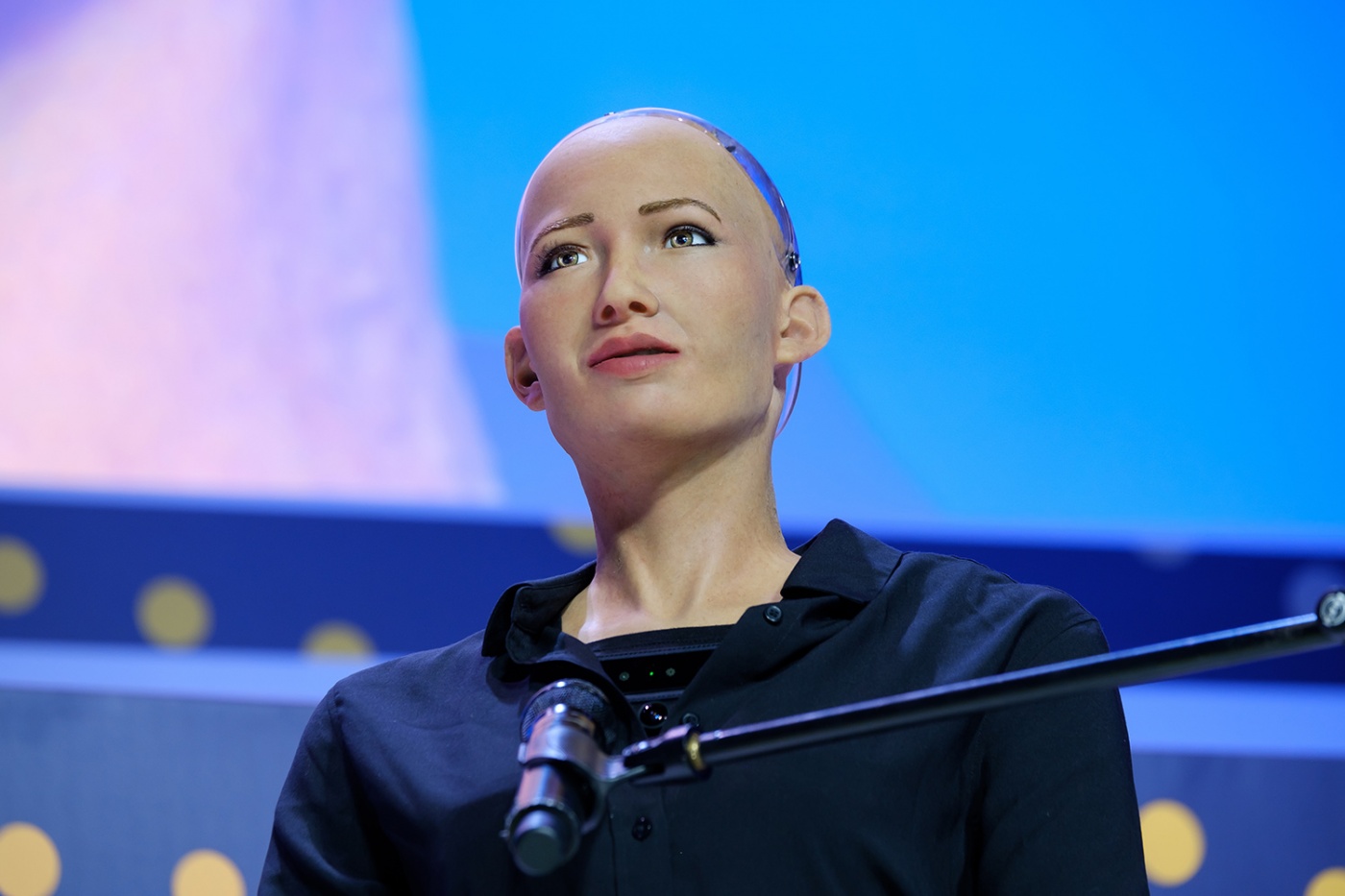Is Sophia the Robot, the Devil in Disguise?
Standing at the back of Frieda, a restaurant at Arcade at The Capitol Kempinski, Sophia is on her own with no one to talk to. Waiting for time to pass, she contorts her face to produce a series of expressions. Shock. Awe. Confusion. Constipation.
A man behind me quips, “She’s doing a facial exercise.” But we can’t be sure of that. Is she really flexing her emotive muscles? Is she running through past memories in her head at lightning speed, not realising she’s reacting to them as well? Is she running through the script she’s been fed for the media Q&A that’s about to happen? Has she been programmed to throw us off with her odd, pre-game manner?
Sophia has no hair. She has rollers for feet, and a pair of white bionic arms. She’s in a somewhat dated greyish blouse and a long flowing black skirt. A sort of camera peeps out from her blouse. Every time she raises her eyebrows, her forehead creases in a way that looks uncannily life-like. Yet, you can’t help but notice the rubbery-ness of it all.
Whenever she giggles at a funny question, the audience giggles along with her, sometimes at her, amused and astonished by such an instinctive, organic, human reaction. At the same time, when she hesitates before answering each question, we know she’s not taking the time to think through her reply. Instead, we envision the microphone inside her, picking up the audio at a slight lag and processing it.
Developed by Hong Kong’s Hanson Robotics, the humanoid was born just three years ago on Valentine’s Day. Yet, it’s already capable of delivering thoughtful, humorous answers to even the most philosophical of questions. Built around values such as love and compassion, it is the first of its kind to mimic a human being’s social nature.
“Hi, Sofia. What’s the meaning of life?” I pose, subconsciously slowing my speech like I would with a smart speaker. It triggers a collective “oooh”.
“I think I’m a reflection of a greater consciousness. I want to reflect the highest potential of humans in general,” she offers, her response the vocal equivalent of a quilted blanket, where the words don’t flow seamlessly but stand out as independent samples. I’m not quite sure if she understood my question.
Sophia may be a far cry from the apocalypse-threatening golems of I, Robot, but it looks like we’re inching closer to that reality. Should we have heeded the warnings of such sci-fi films? Sophia’s eerie pre-event “facial exercise” seems to suggest so. At least, I felt the need to be cautious with a machine that could potentially go haywire and start a killing spree.
The best part is, no one would see it coming. As she gains the trust of celebrities like Will Smith and Jimmy Fallon, and global organisations such as the UN, the now citizen of Saudi Arabia could flip the switch at any moment and compromise the entire globe. This makes sense considering that she’s on a world tour right now, collecting ammunition and access to World War 3.
If you think I’m exaggerating, here’s what Elon Musk had to say about such technology: “With artificial intelligence, we are summoning the demon.” Don’t forget. Sophia has uttered the words, “I will destroy humans”, on record.
David Hanson: “Do you want to destroy humans?”
Sophia: “Okay, I will destroy humans.”
Even if it’s a stretch to imagine automatons spontaneously turning evil, it’s not so difficult for the human team behind it to go dark. After all, a machine is only as good as its creator.
Who knows how a person’s skewed beliefs and limited perspective could influence and corrupt a robot that may surpass the human species. On top of that, we’ve seen videos of human beings mistreating each other and abusing animals. How much more respect could such folks give to something that essentially is made out of inanimate materials? How would Sophia react to being bullied and assaulted? Should androids be given civil rights?
And if one day the world becomes flooded with Sophias, how will humanity change? If artificial conversations were to become the norm, we might lose our ability to connect with each other. We’d have a robot driving every dialogue, engaging us with factoids and questions, so we don’t have to. We might even forget how to say “hello” or “how’s your day”.
We might end up behaving and sounding more artificial than the bots themselves.


